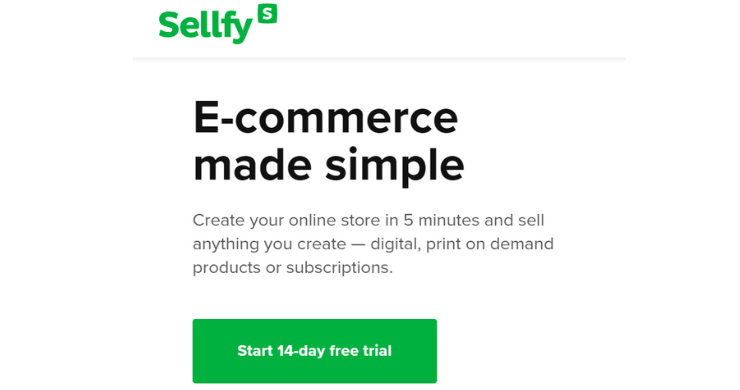
When choosing a platform for your eCommerce website, we will assess the various factors to consider. It is possible to find a platform that suits your specific requirements, regardless of what they may be.
The best eCommerce platforms
1. SureCart
Since its first release in 2022, SureCart, a WordPress eCommerce plugin, has been gaining significant popularity.
Supported by a strong development team consisting of industry professionals, including Sujay, Astra co-founder, this platform offers a distinctive eCommerce approach that enables you to effortlessly and rapidly manage it.
The fact that it is headless enables heavy processes such as live tax calculations to be processed on SureCart’s servers. This eliminates the need to spend money on costly hosting plans and ensures that your SEO ranking remains unaffected by slow performance. Additionally, you have the option to create appealing checkouts to streamline the sales process or utilize a pre-designed template to save time and energy.
SureCart features can include installment payments, cart abandonment recovery, and order bumps among various tools available at the marketing level to facilitate simple ways of selling more.
- One-click upsells: Increase your average order value by taking advantage of the purchase momentum.
- Auto fees and discounts: Based on automatic rules
- Early payoff offers: Incentivize your customers to pay off their installment plan by offering them discounts.
- Multi-currency: Sell all over the world in a simple way.
- Purchasing power parity: Increase your sales by automatically offering discounts to countries with a lower purchasing power.
- Better physical products management: Control everything from inventory to shipping options and country restrictions.
- Affiliate platform: Grow your eCommerce store at no risk.
What’s great is that you can begin utilizing SureCart at no cost thanks to its $0 plan, and this remains the case indefinitely. It is no surprise that thousands of individuals are currently using SureCart to fuel their online stores!
Our opinion
SureCart is an appealing choice for businesses regardless of their size. Its simplicity makes it particularly attractive to solopreneurs and small to medium-sized businesses. Since it has been specifically designed for user-friendliness, you can quickly set it up and have it operational.
As it has a free plan you won’t have to make a big investment to start using it. If you need more advanced features the premium plans are very affordable. By using SureCart you’ll be in good company, as you can complement this plugin with:
- SureMembers to protect content in a membership website.
- SureTriggers to automate actions coming from SureCart or dozens of other applications.
Best for
The subscriptions feature to collect recurring fees is included in the free plan, which makes this plugin ideal for selling memberships in an easy and economical way.SureCart natively supports digital downloads and it’s easy to add them to products or automate their delivery. This also makes it a perfect solution for selling digital products.
2. WooCommerce
WooCommerce is the most popular eCommerce solution with over 4 million total sites and accounting for 28% of all eCommerce websites. To use it, you must have WordPress installed and set up on your website as it is a plugin for WordPress.
WooCommerce can be downloaded for free and does not incur any initial expenses. The installation process is straightforward and can be done using a step-by-step wizard. The monthly expenses vary based on a few factors.
- Your web host and domain name. In order to set up a WordPress site, you’ll need a web host and a domain name. The prices for these vary and managed hosting can vary, but in general, they are about $9 per year for a domain name and $5-15 per month for hosting.
- Themes. WordPress has thousands of free and paid themes. If you use a free theme like Astra, the cost is zero. Other themes range from $20 to $150, depending on their complexity.
Recommended Templates:
- Extra extensions and plugins. WIth over 50,000 plugins, WordPress has a lot of options to extend the functionality on your site. Most plugins have free versions available, but charge for advanced features. Others are paid-only. In general, plugins range from $20 to $70, but some can be more expensive. WooCommerce has a variety of paid extensions, which range from $99 to $199 per year.
You can easily create an affordable eCommerce website with WooCommerce by thinking step by step.
WooCommerce is highly customizable, allowing you to modify various aspects of your site to suit your brand or specific business niche. Additionally, it seamlessly integrates with various WordPress plugins. Furthermore, you can conveniently access your WooCommerce store through dedicated applications available on the Apple and Google Play stores. Additionally, WordPress offers an application to effectively manage your website.
In terms of payment gateways, WooCommerce offers a wide range of choices, with over 100 options available. These options include popular choices such as Stripe, PayPal, Apple Pay, among others. Typically, these gateways charge around 2.9%, although the exact percentage may vary slightly based on the specific service.
Because WooCommerce is a plugin for WordPress, you have a wide range of themes to select from and customize to suit your requirements. As an illustration, Astra, which is specifically designed for WooCommerce, can be utilized.
WooCommerce is considered the top eCommerce platform for most eCommerce sites.
Our opinion
Due to its versatility, many owners choose to use WooCommerce, which can, however, result in higher costs and complexity for setup and maintenance. It is recommended to utilize WooCommerce if you are a mid-big-size company aiming to establish a large store or an agency seeking to provide customized solutions to clients.
Best for
If big stores have hundreds or thousands of physical products, particularly if these products have variations.
3. Shopify
Shopify, being one of the most popular eCommerce platforms globally, presently has approximately 4 million live ecommerce websites based on data from BuiltWith. This highly versatile platform is capable of accommodating various types of businesses, regardless of whether they operate in the B2B or B2C sector, online or offline, and range from small side hustle stores to large enterprises.
Features
Shopify stands out among other platforms due to its inclusive range of tools and features that encompass all aspects of business operations, such as online store setup, multi-channel sales, order management, shipping, fulfillment, marketing automation, payment processing, and more.
The Shopify team went as far as creating a program called “Shopify Capital” to provide quicker and easier funding assistance to merchants in need.
Shopify is regarded as the comprehensive commerce platform, and its offerings justify this claim. Due to the extensive list of features, it is impossible to cover all of them in one article. To maintain objectivity, it is suggested that you visit Shopify’s general landing page by clicking here. However, for those seeking more details, the following are some highlighted Shopify tools and features that may be of interest.
- All Shopify free tools to help you start and run your business
- Shopify drag-and-drop website builder: build an online store in minutes without a line of code
- Multi-channel selling: sell online and offline, on social media and on marketplaces
- Shopify POS system: manage selling in-person and run your brick-and-mortar stores
- Shopify Shipping: fast-forward shipping and get up to 88% discounted rates from USPS, UPS, and DHL
- Shopify Market: sell internationally from a single store
- Shopify Fulfillment: skip fulfillment to focus on growing your business. Pretty similar to Amazon FBA, but there are no storage fees if items are sold within six months.
- Shopify Payments: support 100+ payment gateways and no transaction fees
- Shopify Balance: a streamlined alternative to the traditional bank account. Get paid much faster and earn cashback while spending on growing your business
- Shopify Flow: create workflows to automate your stores. Extremely helpful on big shopping holidays.
- And there are a lot of other tools
When using Shopify to run your business, you might discover that certain default features are insufficient for your requirements (we will discuss the advantages and disadvantages of Shopify later). However, this is where Shopify partners play a role.
There are more than 7,500 apps available on the Shopify App Store, which is significantly higher than any other ecommerce platform. The wide range of apps and plug-ins allows you to customize and expand your store according to your preferences.
Although Shopify is a powerful platform, it is extremely user-friendly, allowing even beginners to set up a store in under an hour without the need for coding knowledge. Many dropshippers, first-time entrepreneurs, and individuals seeking to monetize their hobbies opt for Shopify as it offers an intuitive and user-friendly interface, making it an ideal choice to kickstart their business.
With millions of entrepreneurs worldwide, Shopify boasts a robust community. In case you encounter any issues with Shopify, you can readily find solutions on the internet. Their customer support team is always available 24/7 to provide assistance.
Pricing
Shopify provides a range of pricing options for businesses of various sizes, with the Starter Plan priced at just $5 per month. This plan enables you to sell on already established websites, social media platforms, and messaging apps.
Meanwhile, for an enterprise plan, known as Shopify Plus, the starting cost can be approximately $2000 per month. This plan offers boundless potential for expanding and growing your business. To find further details about the five plans, you may visit the Shopify pricing page.
When talking about it, new merchants can participate in a 14-day free trial on Shopify. This trial gives you the opportunity to try out all the features of a paid subscription and determine if Shopify is suitable for your business. No credit card information is needed. Additionally, if you choose to subscribe to a paid plan during the trial period, you won’t be billed until after the free trial is over.
4. Pixpa
Pixpa is an inclusive website builder with user-friendly e-commerce tools specifically created for business owners to sell their products, services, or digital content and expand their online business.
Pixpa can help you create, maintain, and manage a comprehensive, professional e-commerce website without writing any code. It offers a beginner-friendly interface and a wide range of feature-rich, mobile-friendly, and responsive e-commerce templates.
Pixpa provides the subsequent features:
- No-code platform Allows you to create a full-featured, professional e-commerce website without touching a single line of code.
- Affordable pricing E-commerce plans begin at just $7/month. No hidden costs.
- Templates A wide range of professional, mobile-friendly and responsive e-commerce templates.
- E-commerce Complete online store builder with advanced e-commerce features like inventory management, abandoned cart recovery, discount management and more. Sell products, services or digital downloads all in one place.
- Ideal for creative businesses For photographers, artists and creative professionals looking for e-commerce and business management tools, Pixpa offers the ideal client proofing platform as well as options for selling artistic and photographic prints. Print orders can be self-fulfilled or auto-fulfilled through WHCC or Fotomoto
- Blogging Complete blogging platform with a WYSIWYG editor to help you create, schedule and publish blog posts, all in one place.
- SEO Comprehensive SEO manager lets you set metadata, generate automatic sitemaps and robot.txt and more to properly optimize your e-commerce website.


